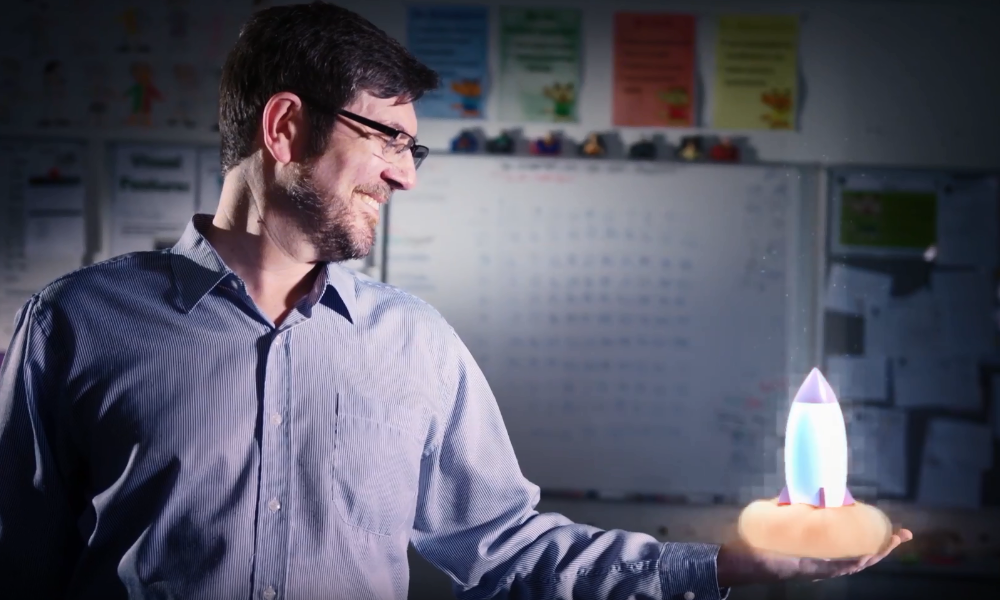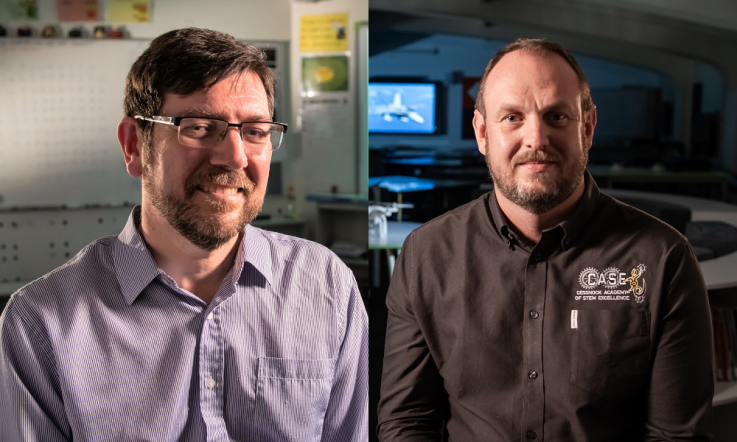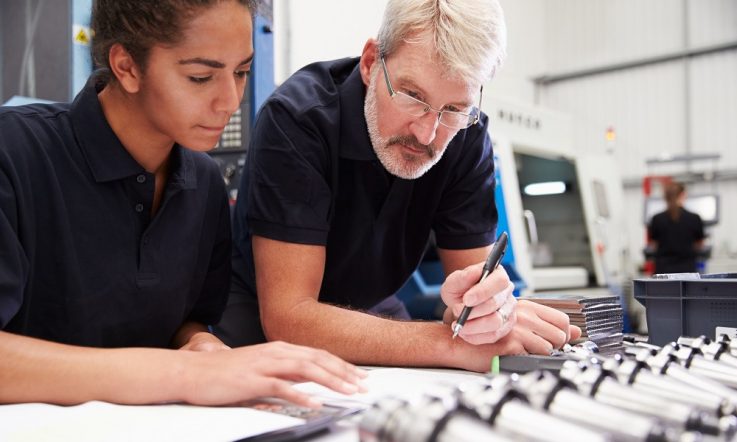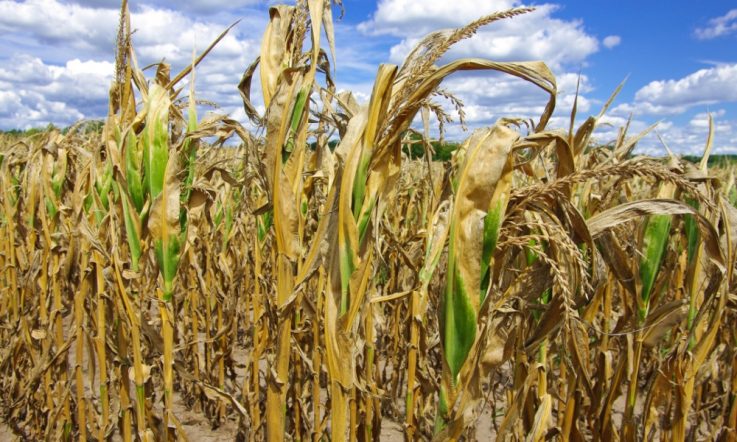This podcast from Teacher magazine is supported by postgraduate teacher education courses at QUT, a university for the real world. The more you learn, the more they learn. So find a flexible course that's right for you, and help make a bigger difference in the classroom, with QUT.
Hello, and thank you for downloading this podcast from Teacher magazine. I'm Dominique Russell.
In this episode of School Improvement, I'm joined on the line by Brett Crawford, the Lead Science teacher at Warrigal Road State School in Brisbane. With over 1300 students and 50 staff members in the primary school, a big task was ahead of Brett when he decided he would work towards improving Science education in every classroom. The impact has been clear – students from Warrigal Road are now entering high school more prepared than ever for Science education and teachers have hit the ground running with inquiry-based Science learning.
Brett has just been recognised for his outstanding work this year, after receiving the award for the Prime Minister's Prize for Excellence in Science teaching. Later in this episode, he'll also be sharing details of a couple of his budget-friendly experiments that students really enjoy, but first, Brett explains a little bit about what Science education was like before he began mentoring teachers.
Brett Crawford: Before I started mentoring at Warrigal Road State School, Science was a lot less focused on inquiry learning and that was a trend that was generally noticed across most of Queensland. Teachers would do Science in their classrooms, but the process skills and the inquiry skills of Science were not getting the appropriate amount of attention that they needed for students to excel in those areas. And, so, the first thing I did was to look at how to structure Science inquiry so that the teachers felt confident doing it in their classrooms, and also that it was meeting the standards of the Australian Curriculum.
Dominique Russell: And so with over 50 teaching staff at your school, how did you actually go about getting each staff member on board with explicit Science teaching in their classrooms?
BC: With so many teachers at the school, you have to begin by working with the willing. So I always knew that there would be teachers who would be more open to working with me and so I just focused on those teachers to begin with. And the philosophy is that once you get those willing teachers engaged in Science and their students are building up their Science skills and excelling in Science, then other teachers then look at that and they want to be part of that as well.
So, I did not work with every single teacher myself, because the other thing this sort of process means, is that once you have people that are skilled, they can then also be mentors to their teaching partners. So, it's a domino effect. So, I was the first port of call, but then we were always encouraging other teachers to talk to their colleagues, show them what they've done. With me continuing to work with the teachers and with that roll-on effect, the whole process moved through the school fairly quickly.
To begin with, I just worked with my year level. So when I started at Warrigal Road, I was put onto Year 4 and I was brought to the school with an eye to them using me for my science skills, my science expertise. So I just began by working with my year level. And the very first day, in the pupil free days before school started, when we were looking at Science assessment, I said to them: ‘Look, the QCAT assessment' – it was actually the Earth Science Unit for Year 4 with Erosion – and I had a familiarity with it, and I said, ‘the QCAT assessment for this is actually pretty good, it's fun, kids are doing hands-on stuff, maybe we could give that a go.' And the other teachers all agreed, that that sounded like a good idea, and so we went from there.
And then, you know, having worked with that year level in my first year; in my second year I was fortunate. Di Carter became our principal, and she had worked with me before at Waterford West [State School] and she gave me the Lead Science Teacher role, which meant that I could then offer advice to other year levels, I could work with the Heads of Curriculum. And then in 2015-2016, I was given two days a week where another teacher was working with me on the class, so she taught Mondays and Tuesdays and then those days, for me, were where I could dedicate that to Science coaching, Science curriculum; actually going out with people and having a lot more time working in their classrooms and helping them out. Teachers were released by the HOCs [Heads of Curriculum] with coaching time to come and speak with me. And that really did jumpstart the whole process.
So, I guess if you think of it as sort of a curve, we started slowly, and then the further we went, the more we were able to do, and it really took hold.
DR: Fantastic. And then, so you've done all that work at the beginning, then, but how do you go about actually maintaining a school environment where everyone is really focused and engaged in Science?
BC: The key to keeping Science at the forefront of people's minds is you've got to work with your admin team. I work closely with the Heads of Curriculum as much as possible. So we talk, we share ideas, I take time to look at how the Science results are going for each year level. I'm also very fortunate in that one of our Deputy Principals, Tyrone Bruce, he's my line manager for Science. So, at Warrigal Road, the different deputies have different portfolios. Tyrone's portfolio includes Science, and we work very well together. So we will get together and we will chat about what's happening in Science, how our Science results are going.
We also have our key Science teachers in each year level. So, there's Literacy teachers who are in charge of overseeing English units for the term. And then there's Numeracy teachers who do the Maths units. And the key Science teachers do the same thing for Science. So they are the ones who, for their year levels, are the first port of call. They make sure that the units are organised, that the resources are there. And we have meetings about twice a term with that key teacher team to talk about how things are going in Science. Are there any things that we need to work on? What's been working well? So it's a very collaborative approach. And anybody who's worked in schools of any size knows that one person really can't drive change, or at least not long-term change. You need to almost ‘infect' the school with change so that it really takes a hold and it becomes a part of the school's mentality.
Schools are like living things, they're organisms. You know you've got to reach every single little part and that's when you know you've made a difference.
DR: And so what about the speciality teachers in the school, then? How did you go about targeting their classroom?
BC: Well, at Warrigal Road, the first group of [speciality teachers] I guess you would say, that I worked with were the hearing impaired teachers. And our Head of Special Education, Linda Brown, was very keen to get the hearing impaired students more involved in regular classroom activities and classroom curriculum.
Apparently there was a type of thinking that those students would mostly be working separately in a separate area. And Linda approached me and was talking about the students, and we mutually agreed – yes I wanted those hearing impaired students (that were in my class anyway), I wanted them in the class doing Science, so that happened. And then that became the norm; that those students did Science in their regular classes and now those students actually work a lot more in all of the curriculum areas.
So that was the first group that I worked with. I've also done some work with our students who are on ICPs [Individual Curriculum Plans] or who have learning support. Sometimes when I had my Science coaching time, those two days a week, I would have some of those students come to me in the last hour of the day on a Tuesday and I would do some work with them helping them to be supported in the Science curriculum they were doing (however modified it might be).
And also when the teachers do their specialist support, most of that at the moment is focusing on Literacy and Numeracy. So those students that are supported, in whatever capacity, they are there in the classroom doing Science. Often they're doing a modified version of the curriculum, depending on their abilities. So, if they are on an ICP we look at what we're doing in Science for that year level and how we can modify it to meet their learning needs. So, in terms of Science a lot of those students are really working in the classrooms anyway, they're just being supported as much as possible and their work is being scaffolded as much as possible to meet what individual needs they have.
DR: Yeah, excellent. And so for the members of staff that were particularly anxious about bringing more explicit Science teaching into their classes, how did you go about easing them into it?
BC: As I said, a lot of it was to do with the inquiry process. The noisy, messy and, ironically, fun side of science. So, getting the students to do proper experiments. And there were things like that happening, but again, sometimes it wasn't necessarily meeting the requirements of the Australian Curriculum, where, by the end of Year 6 students are supposed to be able to come up with an inquiry question and identify variables and write their procedure.
I use a lot of stuff from Primary Connections, a wonderful resource – Australian Academy of Science came up with it (for those people who aren't familiar with it); and if it's the Australian Academy of Science, you'd think they'd know what they're doing, and they really do. They know their stuff. And I was trained by that as a Science Spark up here in Queensland, when that was happening in 2010, 2011 and 2012.
And so it was going into people's classrooms and really starting with basic stuff, like: how do you write a science question? How do you write an investigable question? What does it look like? And, for me, it was an ongoing process. It didn't strike me like a bolt of lightning by any means. It was: try something and does this help teachers to understand what it's like?
And through a process of exploration myself, I sort of streamlined the process down. And now we have, in every classroom, posters as resources that show the students and the teachers: this is how you come up with an inquiry question; this is how you identify your variables. And the great thing is that we have made that a uniform process throughout the school.
So, starting in Prep – where they're just beginning to do basic observations – we start that whole inquiry process. By the time they get to Grade 2, we're talking about variables in experiments. By the time they get to Grade 4, they are seeing that there is a set way that we do our investigations throughout the school. By the time they get to Grade 6, they've probably done, maybe 40 or 50 of these types of investigations. Gradually getting more complicated as they work their way up through the school, but always following the same process: this is how you write the question; this is how you think about what your variables are; this is what we mean by a prediction.
So it's that constant process. You are constantly giving them the same message over and over again. And that is a big part, too, of our Science success – that across classes and across year levels, we have that uniformity of how we approach Science. So students and parents know whoever's class you're going into, this is how Science is going to be taught. This is the sort of thing you're going to expect. And our high school colleagues have said to us: ‘your guys come to us well-prepared for Year 7 Science'.
So that, for me, is one of biggest measures of success; that people at high school say: ‘yes, when they get to our door, we know your Warrigal Road students are ready'.
DR: And I noticed that you have quite a good relationship with the high school in that respect, and also that you've connected with universities and businesses in the area. Why is that important to you, particularly working at a primary school?
BC: Kids need to see that what they're learning in schools is not isolated, it's not limited to the classroom. So, when we get people who work in science fields coming into the school, it makes the science that they're learning here so much more meaningful. So, when we, for example, are studying things about light in Year 5 and the students are doing things like breaking up lights into parts of the spectrum. I suppose, in a way, it's pretty basic stuff, because they are just getting exposed to those ideas.
But when we can get somebody from Technology Park coming over – people who do work on radar guidance systems for the Air Force – and they can talk about ‘this is how we use light … so you are doing this, but when you are out beyond high school and beyond tertiary, these are the sorts of things that we use light for'. It just adds another level to the students' learning.
Or when we have people who are biologists or environmental scientists coming in and talking about how they work in the field with different types of animals, or engineers who are responsible for building things. Drone pilots, who actually use drones for mapping, for people when they're surveying properties. The students see that, ‘oh, well what I am doing is leading up and up and up' and it just connects to the community and those professionals are so excited to come in and talk to students and show them the exciting things that they're doing in science. It really just adds another dimension to it, and it keeps the kids enthusiasm fresh. They're always wondering ‘what could I do? What possibilities are there out there?'
DR: Could you talk us through one or two of the budget-friendly experiments that you bring into the classroom that the students really enjoy?
BC: Okay. Well, dry ice is fantastic, can I just say. That's probably one of the more expensive things that I buy. And there's a place not too far from where I live where I can get it for about $5 a kilogram. Obviously, it's not something that the students can handle, but if you want to demonstrate to students in Year 5 that gasses actually flow like liquids – which, for them, just seems like: ‘no, that can't be right, Mr Crawford. A gas is not liquid; air is not water.'
But you put some dry ice into some food containers, some plastic food containers. Connect them with ramps made of aluminium foil at different levels and actually create a fog slide so that you put the dry ice at the top and you add some water and the fog flows out and it flows down the slide to the next container and the next container and the next container and the students see: ‘oh, this is the phenomenon'. And that's always what you've got to do. And that's a big part of Primary Connections, you've got to show the kids the phenomenon before you try to explain it.
One of the ones I'm most proud of was teaching students: why do cyclones spin? And it's all to do with the spin of the Earth and the Coriolis force and the parts of the Earth spinning at different speeds. And it's such a good concept. And I thought, ‘how could I possibly show this in the classroom? It doesn't seem realistic.' But then I went away and I Googled it; and I learned terms like ‘conservation of angular momentum' – and by the way, I am not a Physics graduate at all, I couldn't do Chemistry and Physics in high school because my Maths learning just didn't support it. So I am not a person with a science background. But, I go away and I looked up Google and I looked up some ideas and, in the end, all we needed were some Lazy Susans (those things that sit in the middle of your kitchen table and spin around) and glue sticks.
And it's just a question of spinning the Lazy Susan at a certain speed and getting the student to roll the glue stick off their hand and onto the spinning disc. And because different parts of the disc are actually spinning at different speeds – the outside of the disc is spinning faster than the inside of the disc – as the glue stick rolls towards the middle, it curves around. And we made a game out of it: can you get the glue stick to roll onto the disc and come back onto your hand? So, the students did that for about five or 10 minutes, they were happy as Larry playing this game. But then we can take that away and say to them: ‘well, here's the thing. The Earth is a little bit like the disc, the equator is the part of the Earth that is spinning the fastest; the further you go towards the poles, the spin of the Earth actually is slower. And as winds move away from the equator they are like the glue stick as they move away, as they're moving across that disc spinning at different speeds, they curve around. What happens with cyclones is no different to what's happening with the glue stick.' And you could see the lightbulb going off in the students' heads – ‘Oh that's what happening!' – but without that simple, little hands-on experiment, the concept is so abstract.
And that's what I think is exciting about Science in primary schools. You can often demonstrate the most complex ideas at a simple level with simple, inexpensive resources, that the students can see what you're doing and then, once they've seen it, you can then build on the understanding. You can give them the technical words, but they have to have seen it. They have to have experienced it, because that's how our brain works. That's how we learn.
One thing I would like to say to teachers out there who don't have that science background is not to be afraid of science. I don't have a background. People sometimes say to me, teachers say to me, I can't teach Science like you, Brett, because I'm not fluent in science. And I say to them: ‘I'm not fluent in science, I'm fluent in Google. Whatever I'm not sure about, I look it up, and I read it, and I try to understand it as best I can before I teach it.'
And the other thing they say to me is: ‘I worry about what's going to happen when I do the wrong thing or when I say the wrong thing.' But, when you think about it, that happens all the time. When you start teaching, you know you are going to make mistakes and that you are going to learn from those mistakes. Science isn't different to any other subject ... Yes, you will occasionally say the wrong thing and realise afterwards, ‘oh I got that wrong.' And you will go forward and you will learn from that.
But, students are so into science. They have the two basic qualities that you'd want for science: they want to know how everything works and they love playing with cool toys. And science has the best ones. All you have to do is tap into that natural enthusiasm and Science in your classroom will flourish. You just have to believe in your own ability.
That's all for this episode. To keep listening or to download all of our podcasts for free, whether it's from our series on Behaviour Management, Global Education, School Improvement, Teaching Methods, Action Research or The Research Files, just visit acer.ac/teacheritunes or soundcloud.com/teacher-ACER. The full transcript of this podcast is available at teachermagazine.com.au. That's where you'll also find the latest articles, videos and infographics for free.
You've been listening to a podcast from Teacher magazine supported by postgraduate teacher education courses at QUT, a university for the real world. The more you learn, they more they learn. So find a flexible course that's right for you, and help make a bigger difference in the classroom, with QUT.
Brett Crawford was supported by his leadership team – he was released from his teaching role for two days a week to do Science coaching and other teachers were given time to work with him.
As a school leader, how could you provide more opportunities for staff to share expertise, collaborate and reflect on their teaching?
Is the staff expertise that exists in your school being fully utilised?



